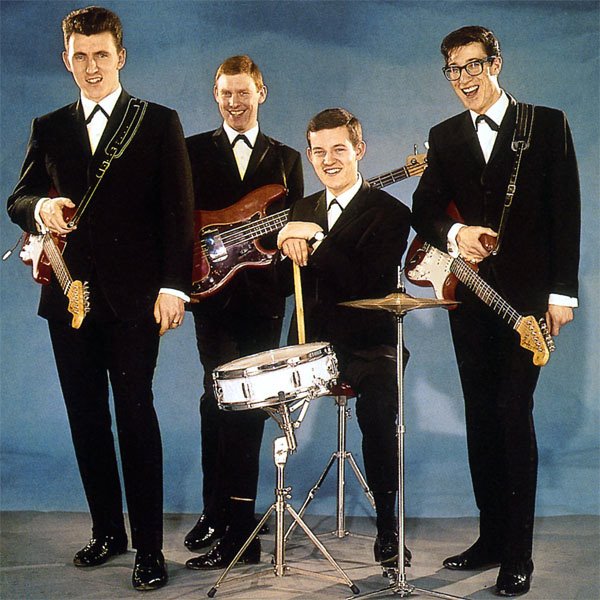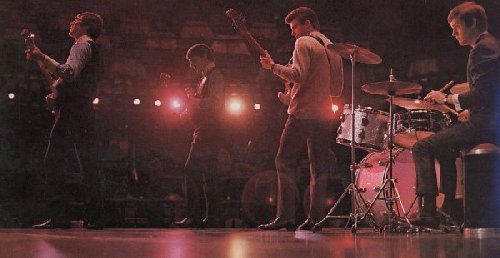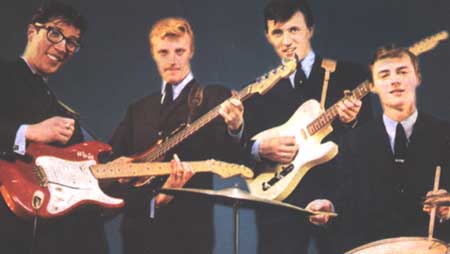| When Harry Webb became Cliff
Richard and his appearances on television generated a heavy tour schedule,
his management, John Foster and Norrie Paramor, replaced the original
band. The group had to be solid. Paramor had already shown his unhappiness
with most of the band when he replaced them for Richard's first recording,
"Move It." |
| Of the Shadows, Hank Marvin
was one of the most influential guitarists and musicians in Britain during
the 1960s. His clean tone and mix of American jazz, country, and pop styles
became the benchmark for British guitarists. Like many musicians of the
era, he began by playing banjo and guitar in skiffle groups. |
| Throughout their years with
Richard, Harris and Meehan worked both separately and together as session
musicians, producers, and recording artists. (This includes helping Harris
with his 1962 "Besame Mucho," a song which was part of the Beatles' repertoire
and their audition at Decca that year.) |
| |
| 1956 [Marvin and Welch age: 13-14] |
| Like many sixties British
rock musicians, Marvin and Welch began their careers when "Rock
Island Line" became a hit. The simple structures of skiffle, and its
minimal instrumentation requirements, was an easy way for teenagers to
make music. In the process, as their technique got better and their tastes
more broad, skiffle was discarded for more complicated and difficult music.
However, Marvin and Welch are living and playing in northern coastal city
of Newcastle, better known for its coal than its music. |
| |
| 1958 [Marvin and Welch age: 16-17] |
| As the era of British rock
and roll began to blossom, Marvin and Welch moved to London and, specifically,
to Soho. Here, like many others, they almost immediately head for the
place where Tommy Steele was popularly believed to have been "discovered."
At the 2I's, they find work (and not all of it musical). Marvin takes
some work with the Vipers playing skiffle/rock and he and Welch play together
in a band called the Five Chesternuts. |
| September: When John
Foster and Norrie Paramor were looking for a new backup band for Cliff
Richard, Marvin and Welch got the nod. [Apparently, Foster and Paramor
asked Marvin and who joined on the condition that they ask Welch too (Strong
1995:729).] They joined Ian Samwell (who had already moved to bass) and
Terry Smart (drums) in the Drifters. |
| November: Another ex-Viper,
Jet Harris, joins the band replacing Ian Samwell on bass. (Samwell moved
into Richard's management.) |
| December: As the year
drew to close, Cliff Richard replaced his friend, Terry Smart, with Tony
Meehan. on drums. Smart became a merchant seaman. |
| |
| 1959 |
| The band begins its own releases
while continuing as Richard's backing group. |
| February: "Feelin' Fine" / "Don't Be a Fool with Love" [The Shadows sing.] |
| July: "Jet Black" / "Driftin'" [bass solo] |
| After the release of the "Jet
Black" single in the US, they changed the name of the band to the Shadows
in order to avoid confusion with the better-known American Atlantic Records
singing group, the Drifters. (Atlantic distributed both groups in the
United States.) |
| They remain with Richard
through several personnel changes and appear in many of his films.
However, they develop independently as a band, releasing both instrumental
and some vocal recordings. The Shadows establish the standard British
rock group line-up: lead guitar, rhythm guitar, bass, & drums. |
| They also develop a
penchant for synchronized stage movements. Bruce Welch comments
that they copied the choreography of the Treniers sax section that
they saw in the film, Don't Knock the Rock: "Hank
and I were in the back and we were impressed at the way the sax
players moved in unison, taken I suppose from the Glen Miller days.
It looked fantastic on stage and we thought, 'We must do something
like that because it looks interesting from the front'" (Leigh
1996: n.p.). |
| December: "Saturday Dance" / "Lonesome Fella" (Welch sings on "Saturday Dance") |
| |
| 1960 |
| 21 July: "Apache"
enters the UK charts, eventually reaching UK number 1. |
| 10 November: "Man of Mystery" [/ "The Stranger"] enters the UK charts, eventually reaching UK
number 5. |
| |
| 1961 |
| 9 February: "F.B.I." enters the UK charts, eventually reaching UK number 6 |
| 11 May: "Frightened City" enters the UK charts, eventually reaching UK number 3. |
| 7 September: "Kon-Tiki" enters the UK charts, eventually
reaching UK number 1. |
| September: The Shadows [released; eventually reaches number 1 on the UK LP
charts] |
| Tony Meehan leaves in
order to pursue a career as a producer. The band and the management
replace him with Brian Bennett (born 9 February 1940). |
| 16 November: "The Savage" enters the UK charts, eventually reaching UK number
10. |
| |
| 1962 |
| 1 March: "Wonderful Land" enters the UK charts, eventually reaching UK number 1. |
| March: Jet Harris leaves
to form a production company and band with Meehan. The Shadows replace
him with Brian "Licorice" Locking. |
| 2 August: "Guitar Tango" enters the UK charts, eventually reaching UK number 4. |
| October: Out of the Shadows LP released. It eventually reaches UK #1. |
| 13 December: "Dance On!" enters the UK charts, eventually reaching UK number 1. |
| |
| 1963 |
| 7 March: "Foot Tapper" enters the UK charts, eventually reaching UK number
1. |
| 6 June: "Atlantis" enters the UK charts, eventually reaching UK number 2. |
| June: Greatest Hits LP released. Eventually reaches UK #2. |
| 19 September: "Shindig" enters the UK charts, eventually reaching UK number 6. |
| "Licorice" Locking decides
to leave the Shadows and try his hand as a solo artist. The Shadows
and management replace him with John Rostill (born 16 July 1942,
Birmingham). |
| 5 December: "Geronimo" enters the UK charts, eventually reaching UK number 11. |
| |
| 1964 |
| 5 March: "Theme for Young Lovers" enters the UK charts, eventually reaching UK number 12. |
| 7 May: "The Rise and Fall of Flingel Bunt" enters the UK charts, eventually reaching UK number
5. |
| May: Dance with the Shadows LP released. Eventually reaches UK #2. |
| 3 September: "Rhythm and Greens" enters the UK charts, eventually reaching UK number 22. |
| 3 December: "Genie with the Light Brown Lamp" enters the UK charts, eventually reaching UK
number 17. |

 |
| |
| 1968 |
| After only moderate success
through the mid sixties, the band temporarily called it quits after Richard
declared himself a born-again Christian and rock music . . . , well, rather
un-Christian. |
|
| References |
| Romanowski and George-Warren 1995; Frame 1995:2; Gambaccini, Rice, and Rice 1995; Strong 1995:729-731. |


